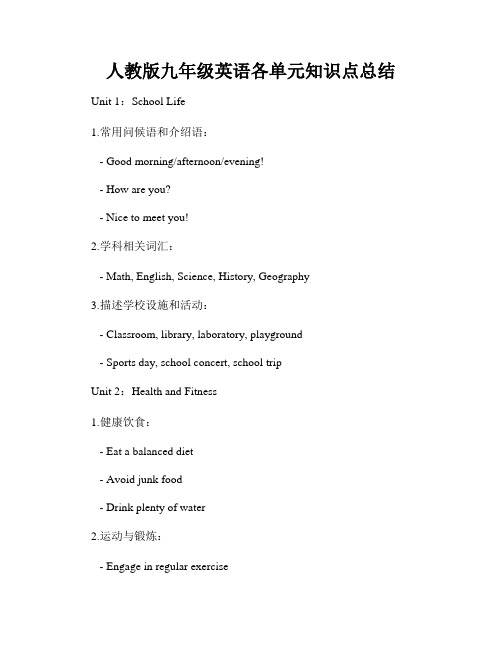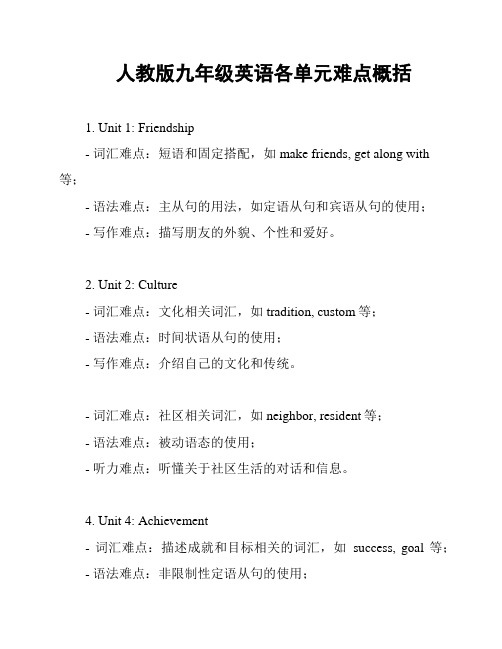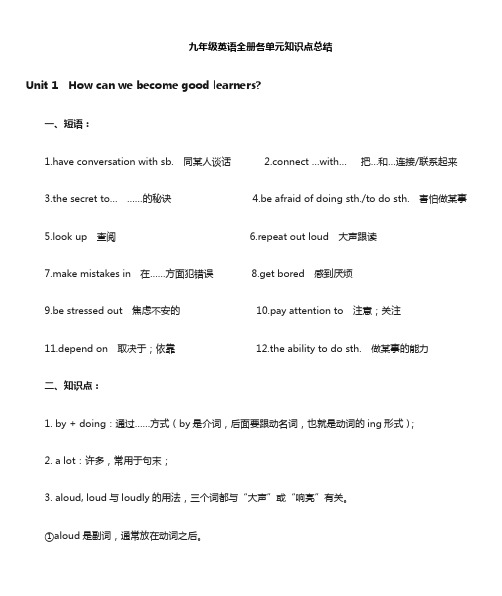人教版初三英语各单元知识点总结
人教版英语九年级单元知识点复习资料.

英语九年级单元知识点复习资料Unit 1Section 1A一、短语1.by介词,“经过 (方式,手段)”by making flashcards 经过做单词抽认卡 by doing sth 经过 .. 方式(门路)。
例: I learn English by listening to tapes.②在.. 旁边。
例: by the window/the door③乘坐交通工具例: by bus/car④在从前,到为止。
例: byOctober 在 10 月前⑤被例: English is spoken by many people.2.read the textbook 读/ 看教科书3.make vocabulary lists列生词表4.listen to tapes 听磁带5.ask sb for help 向某人求援6.study for a test 为备考学习7.watch videos 观看录像8.practice sth练习某事 ;practice doing sth练习做某事Do you ever practice conversations with friends (与朋友对话 )? I have to practice speaking English everyday.9.read aloud 朗诵10.that way=in that way经过那种方式11.improve my speaking skills提升我的会话技巧12.tooto太 .而不可以It ’ s too hard for me to understand the article. = Itthat I can ’ t understand the article.13. for example=for instance比如14.ask about 咨询有关 ;ask sb about sth 向某人咨询 /探询有关 . We asked them about the best ways to learn more English. I want to ask about the use of the new machines.15.watch/see/hear sb do sth 观看/看见/听见某人做过某事 ;watch/see/hear sb doing sth观看 /看见 /听见某人正在做某事He can watch actors say the words. Can you hear him singing in the room?16.辨析 :sometime ;sometimes ;some times ;some time① sometime 在未来 /过去的某一时间I ’llspeak to him about it sometime. 我会找个时间和他谈谈这事. I met her sometime last year.昨年的某个时候我见过她. ②sometimes = at times 有时 ,有时 It is sometimes hot and sometimes cold here. He sometimes writes to me.③ some time A. 一些时间 :It will take you some time to walk there. B. 在未来的某时 =sometime: Phone me some time next week 下个礼拜什么时候给我打电话吧.④some times 一些次 ,几次 I've told him the thing some times.17. join 短语 :① join sb 加入到某人的活动中去② join in+ 活动项目 " 参加活动 " I'd like to join in the game. ③ join+ 组织机构 " 加入到某个组织机构 ,成为此中的一个成员 "join the Party; join the League, The best way toimprove your English is to join an English club18.have fun 玩得快乐19.not at all 一点也不20.get excited 快乐、激动21.end up (vi.) 结束 ; 告终 ; 结果 ; 最后end up doing sth.We end up taking a taxi there .我们结果乘出租车去了那里 . We sometimes end up speaking in Chinese.( 以说汉语结束对话 )22. do a survey做检查 ;do a survey about 针对做检查I'm doing a survey about learning English. 我在进行学习英语的检查。
人教版英语9年级1-5单元知识点总结

Unit 1How can we become good learners?单元知识背记手册◇Section A重点单词1. textbook 教科书;课本2. conversation 交谈;谈话3. aloud 大声地;出声地4. pronunciation 发音;读音5. sentence 句子6. patient 有耐心的;病人7. expression 表情;表示;表达方式8. discover 发现;发觉9. secret 秘密;秘诀;秘密的;保密的10. grammar 语法11. repeat 重复;重做12. note 笔记;记录;注意;指出13. chemistry 化学◇Section A重点短语1. listen to tapes听录音磁带2. have conversations with sb.同某人交谈3. give a report 作报告4. at first 起初;开始5. word by word 逐字逐句地6. be afraid to do sth.害怕做某事7. because of 因为8. fall in love with 爱上9. as well 也10. look up (在词典、参考书中或通过电脑)查阅;抬头看11. take notes记笔记12. keep a diary 记日记◇Section B重点单词1. pronounce 发音2. increase 增加;增长3. speed 速度4. ability 能力;才能5. create 创造;创建6. active 活跃的;积极的7. attention 注意;关注8. connect(使)连接;与……有联系9. review 回顾;复习10. knowledge 知识;学问◇Section B重点短语1. make mistakes 犯错误2. be born with 天生具有3. depend on 取决于;依靠,依赖4. be interested in对……感兴趣5. pay attention to 注意;关注6. connect…with 把……和……连接或联系起来7. think about 考虑8.even if 即使9.write down 写下;记下10.find out 找出;发现;弄清楚11.be stressed out 紧张的;有压力的12.bit by bit 逐渐地;一点点地13.instead of 代替;而不是◇词形变换1.pronounce→(名词)pronunciation2.expression→(动词)express3.discover→(名词)discovery4.memorize→(名词)memory5.wisely→(形容词)wise◇重点句型1.It's too hard to understand spoken English.理解英语口语太难了。
人教版九年级英语全册各单元知识点和配套练习

新目标九年级英语单元知识点及配套练习Unit 1 How do you study for a test?1、一般现在时(特别是单数第三人称作主语);2、动词作主语的形式(现在分词和不定式);3、介词后面的动词形式(~ing);4、What about+~ing;How about+~ing;5、too+形(副)+to(不定式);6、find+宾语+宾语补足语;7、not…at all;8、get+形容词;9、某些动词后面的动词必须用~ing;10、unless条件状语从句→if条件状语从句→…,or…〔并列句〕;11、instead/instead of;12、listen to13、ask(sb.)for(sth.);14、for example;15、have fun(doing sth.)16、end up〔with…)17、spoken English;English—speaking18、make mistakes19.talk to(with) sb.20、why don’t you(we,they 〕+动词原形=why not+动词原形21、laugh at22、first of all23、to begin with.24、later on25、be afraid of sth.(doing);be afraid to do sth.;be afraid that从句26、in class/out of class /after class27、take notes28、get an“A〞in English29、(sb.)be impressed by(with)…30、have trouble doing sth.(回见15)31、look up32、make up a conversation.33、around the world.34、deal with35、stay(keep)+形容词36、go by37、decide(not)to do sth.38、主语+last(延续) for long39、regard sb.(sth.)as…/hink of sb.(sth.)as…40、complain about sth.41、compare sth to sth.〔把…比作…〕;compare sth with sth.〔把…及…进展比拟〕42、physical problems43、break off44、in a positive way45、study for a test46、learn a lot 〔in〕that way47、keep an English notebook48、区别:sound,voice,noise49、区别:loud,aloud,loudly50、find sb./sth.+宾语补足语;find it +宾语补足语+〔for sb.〕to do sth.51、try one's best 〔to do sth.〕52、with the help of =with one's help53、much too 及too much练习:1.Everyone ______(want)to study English well.2.______(listen) to English every day ______ (help) him a lot.3.How about ______ (be) a musician That's great!4.The stone looks too big for her to move.(1)译成汉语;〔2〕用so…that…改写。
人教版九年级英语各单元知识点总结

人教版九年级英语各单元知识点总结Unit 1:School Life1.常用问候语和介绍语:- Good morning/afternoon/evening!- How are you?- Nice to meet you!2.学科相关词汇:- Math, English, Science, History, Geography3.描述学校设施和活动:- Classroom, library, laboratory, playground- Sports day, school concert, school tripUnit 2:Health and Fitness1.健康饮食:- Eat a balanced diet- Avoid junk food- Drink plenty of water2.运动与锻炼:- Engage in regular exercise- Participate in team sports- Stay active and fitUnit 3:Life in the Future1.将来时态:- 表示将来的时间状语:tomorrow, next week, in the future - 一般将来时的句型结构:主语 + will + 动词原形2.描述未来科技:- Flying cars, robots, virtual reality- Advanced medical technology, space travelUnit 4:Great People and Events1.描述历史人物和事件:- Martin Luther King Jr.- The Industrial Revolution2.过去完成时的用法:- 表示在过去某一时间之前已经完成的动作或状态- 句型结构:主语 + had + 过去分词Unit 5:Wonders of Nature1.自然现象及灾害:- Earthquakes, tsunamis, hurricanes- Aurora, rainbow, lightning2.介绍自然地理奇观:- The Grand Canyon, The Great Barrier Reef - Mount Everest, Niagara FallsUnit 6:Science and Technology1.科学与技术相关词汇:- Invention, experiment, microscope- Computer, smartphone, internet2.描述科学实验和发明:- Conduct experiments- Invent new gadgets and devicesUnit 7:Mysteries of the Mind1.描述情感和人类思维:- Happiness, sadness, anger, fear- Curiosity, imagination, creativity2.探讨心理学现象:- Dreams, memory, perception- Phobias, personality traitsUnit 8:Travel and Adventure1.旅行相关词汇:- Passport, suitcase, ticket, destination- Adventure, exploration, sightseeing2.介绍旅行目的地和经历:- Visit famous landmarks- Try local cuisine and experience different culturesUnit 9:Global Challenges1.全球问题与环境保护:- Climate change, pollution, deforestation- Recycling, renewable energy, conservation2.探讨解决方案和建议:- Reduce carbon emissions- Support sustainable development希望以上九个单元的知识点总结能对你有所帮助,这些知识将有助于你在英语学习中更好地理解和应用。
最全面人教版九年级上册英语各单元知识点总复习归纳总结

最全面人教版九年级上册英语各单元知识点总复习归纳总结Unit 1: Hello!- Greetings and introductions: Learn how to greet people and introduce yourself.- Numbers: Practice numbers and learn how to say and write them.- Personal information: Learn how to ask and answer questions about personal information like name, age, and nationality.Unit 2: How Do You Study for a Test?- Study methods: Learn different ways to study for tests and improve learning efficiency.- Time management: Understand the importance of time management in studying.- Test preparation: Learn strategies for preparing effectively for exams.- Giving advice: Practice giving and receiving study advice using modal verbs.Unit 3: What Are You Doing for Vacation?- Vacation plans: Learn how to talk about your plans for the vacation.- Leisure activities: Discuss different leisure activities and preferences.- Present continuous tense: Understand and use the present continuous tense to talk about present actions.- Future plans: Express future plans and intentions using "be going to" and present continuous tense.Unit 4: I Used to Be Afraid of the Dark.- Past experiences: Learn how to talk about past experiences using "used to" and simple past tense.- Phobias and fears: Discuss different phobias and fears people may have.- Narrative tenses: Understand and use narrative tenses to talk about past events.Unit 5: What is the highest mountain in the world?- Geography and landmarks: Learn about different geographical features and famous landmarks.- Describing places: Practice describing different places using adjectives.- Research skills: Learn how to conduct research and gather information about different topics.Unit 6: Why don't you get her a scarf?- Giving suggestions: Practice suggesting and responding to suggestions.- Gift ideas: Discuss different gift ideas for various occasions.- Buying clothes: Learn how to describe and buy clothes in a store.- Preferences: Express personal preferences and opinions using adjectives.Unit 7: Teenagers should be allowed to choose their own clothes.- Rules and regulations: Discuss rules and regulations for teenagers.- Arguments for and against: Present arguments for and against a given topic.- Writing an opinion article: Learn how to write an opinion article expressing personal views.- Persuasive language: Use persuasive language to convince others of a certain viewpoint.Unit 8: I'll help clean up the city parks.- Volunteering: Discuss different volunteer activities and their benefits.- Environmental issues: Learn about environmental problems and ways to address them.- Expressing willingness: Use "will" and "be willing to" to express willingness to help.- Making suggestions: Practice making suggestions on how to improve the environment.Unit 9: What does he look like?- Physical appearance: Learn vocabulary to describe people's physical appearance.- Personality traits: Discuss different personality traits and their impact on people's lives.- Describing people: Practice describing people using adjectives and sentence structures.- Role plays: Act out different scenarios and describe the characters involved.以上是最全面人教版九年级上册英语各单元知识点的总复习归纳总结。
人教版九年级全册英语1-8单元知识点期末复习提纲

人教版九年级全册英语1-8单元知识点复习提纲第一单元1.so that引导结果状语从句时,从内容上看主句和它引导的结果状语从句有因果关系,主句为因,从句为果。
He got up late so that he didn't catch the first bus.他起床晚了以致于他没有赶上第一班车。
(表结果)so...that...和such...that...意为“如此……以致于……”,引导结果状语从句。
(1)so +形容词/副词+ that +从句This story is so interesting that I want to read it again.这个故事如此有趣,以致于我想再读一次。
He spoke so quickly that I couldn't follow him.他说得如此快,以致于我跟不上他。
(2)so+形容词+ a/an +单数可数名词+ that +从句She is so lovely a girl that everyone loves her.她是如此可爱的一个女孩, 以致于每个人都喜欢她。
(3)“such+ a/an+形容词+单数可数名词+that+从句”以及“such+形容词+复数可数名词/不可数名词+that+从句”She is such a lovely girl that everyone loves her.她是如此可爱的一个女孩,以致于每个人都喜欢她。
Those are such beautiful flowers that the girl wants to pick them.那些花是如此漂亮,以致于女孩想要摘下它们。
2.look for寻找-Let's look for the lost child. -OK.-我们一起寻找丢失的孩子吧。
-行。
look after照顾;近义词组有take care of和care for。
人教版九年级英语各单元难点概括

人教版九年级英语各单元难点概括1. Unit 1: Friendship- 词汇难点:短语和固定搭配,如make friends, get along with 等;- 语法难点:主从句的用法,如定语从句和宾语从句的使用;- 写作难点:描写朋友的外貌、个性和爱好。
2. Unit 2: Culture- 词汇难点:文化相关词汇,如tradition, custom等;- 语法难点:时间状语从句的使用;- 写作难点:介绍自己的文化和传统。
- 词汇难点:社区相关词汇,如neighbor, resident等;- 语法难点:被动语态的使用;- 听力难点:听懂关于社区生活的对话和信息。
4. Unit 4: Achievement- 词汇难点:描述成就和目标相关的词汇,如success, goal等;- 语法难点:非限制性定语从句的使用;- 阅读难点:理解关于成功人士的文章和资料。
5. Unit 5: Environment- 词汇难点:环境保护相关词汇,如pollution, recycling等;- 语法难点:情态动词的使用;- 写作难点:写一篇关于环境保护的文章。
6. Unit 6: Entertainment- 词汇难点:与娱乐相关的词汇,如concert, performance等;- 语法难点:直接引语和间接引语的转换;- 听力难点:听懂有关娱乐活动的对话和信息。
7. Unit 7: Technology- 语法难点:虚拟语气的使用;- 阅读难点:理解关于科技发展的文章和报告。
8. Unit 8: Health- 词汇难点:与健康相关的词汇,如exercise, diet等;- 语法难点:情态动词和情态动词的一般疑问句;- 听力难点:听懂与健康生活方式相关的对话和广播。
9. Unit 9: Future- 词汇难点:与未来相关的词汇,如dream, plan等;- 语法难点:虚拟语气的运用;- 写作难点:描述自己的未来计划。
人教版九年级英语全册各单元知识点总结

九年级英语全册各单元知识点总结Unit 1 How can we become good learners?一、短语:1.have conversation with sb. 同某人谈话2.connect …with… 把…和…连接/联系起来3.the secret to… ……的秘诀4.be afraid of doing sth./to do sth. 害怕做某事5.look up 查阅6.repeat out loud 大声跟读7.make mistakes in 在……方面犯错误8.get bored 感到厌烦9.be stressed out 焦虑不安的10.pay attention to 注意;关注11.depend on 取决于;依靠12.the ability to do sth. 做某事的能力二、知识点:1. by + doing:通过……方式(by是介词,后面要跟动名词,也就是动词的ing形式);2. a lot:许多,常用于句末;3. aloud, loud与loudly的用法,三个词都与“大声”或“响亮”有关。
①aloud是副词,通常放在动词之后。
②loud可作形容词或副词。
用作副词时,常与speak, talk, laugh等动词连用,多用于比较级,须放在动词之后。
③loudly是副词,与loud同义,有时两者可替换使用,可位于动词之前或之后。
4. not …at all:一点也不,根本不,not经常可以和助动词结合在一起,at all 则放在句尾;5. be / get excited about sth.:对…感到兴奋;6. end up doing sth:终止/结束做某事;end up with sth.:以…结束;7. first of all:首先(这个短语可用在作文中,使得文章有层次);8. make mistakes:犯错make a mistake 犯一个错误;9. laugh at sb.:笑话;取笑(某人)(常见短语)10. take notes:做笔记/记录;11. native speaker 说本国语的人;12. make up:组成、构成;13. deal with:处理、应付;14. perhaps = maybe:也许;15. go by:(时间)过去;16.each other:彼此;17.regard… as … :把…看作为…;18.change… into…:将…变为…;19. with the help of sb. = with one's help 在某人的帮助下(注意介词of和with,容易出题)20. compare … to …:把…比作… compare with 拿…和…作比较;21. instead:代替,用在句末,副词;instead of sth / doing sth:代替,而不是(这个地方考的较多的就是instead of doing sth,也就是说如果of后面跟动词时,要用动名词形式,也就是动词的ing形式)22.Shall we/ I + do sth.? 我们/我…好吗?23. too…to:太…而不能,常用的句型是too+形容词/副词+ to do sth.Unit 2 I think that moon cakes are delicious!一、短语:1. the Lantern Festival 元宵节2. the Dragon Boat Festival 端午节3. the Water Festival 泼水节4. remind sb. of 使某人想起5. eat five meals a day 一天吃五餐6. put on five pounds 体重增加了五磅7. treat sb. with. 用/以……对待某人8. be similar to... 与.......相似9. end up 最终成为/处于10. share sth. with sb. 与……分享……11. as a result结果12. one... the other... (两者中的) 一个…另一个…13. take sb. out for dinner 带某人出去吃饭14. dress up 乔装打扮15. haunted house 鬼屋16. the beginning of new life 新生命的开始二、知识点:1.宾语从句:(三大考点:引导词、时态和语序。
- 1、下载文档前请自行甄别文档内容的完整性,平台不提供额外的编辑、内容补充、找答案等附加服务。
- 2、"仅部分预览"的文档,不可在线预览部分如存在完整性等问题,可反馈申请退款(可完整预览的文档不适用该条件!)。
- 3、如文档侵犯您的权益,请联系客服反馈,我们会尽快为您处理(人工客服工作时间:9:00-18:30)。
初三英语各单元知识点详细总结Unit 1一、知识点1.Check in : 在旅馆的登记入住。
Check out: 在旅馆结账离开。
2.By: ①通过…..方式(途径)。
例:I learn English by listening to tapes.②在…..旁边。
例:by the window/the door③乘坐交通工具例:by bus/car④在……之前,到……为止。
例:by October在10月前⑤被例:English is spoken by many people.3.how与what的区别:how通常对方式或程度提问,意思有:怎么样如何,通常用来做状语、表语。
what通常对动作的发出者或接受者提问,意思为什么,通常做宾语,主语。
①How is your summer holiday? It’s OK.(how表示程度做表语)②How did you travel around the world? I travel by air.③What do you learn at school? I learn English, math and many other subjects.①What…think of…? How…like…?②What…do with…? How…deal with…?③What…like about…? How…like…?④What’s the weather like today? How’s the weather today?⑤What to do? How to do it?e.g. What do you think of this book?=How do you like this book?I don’t know what I should do with the matter.=I don’t know how I should deal with it.What do you like about China?=How do you like China?I don’t know what to do next step?=I don’t know how to do it next step?㊣What good / bad weather it is today!(weather为不可数名词,其前不能加 a )㊣What a fine / bad day it is today! (day为可数名词,其前要加 a )4. aloud, loud与loudly的用法: 三个词都与"大声"或"响亮"有关。
①aloud是副词,重点在出声能让人听见,但声音不一定很大,常用在读书或说话上。
通常放在动词之后。
aloud没有比较级形式。
如: He read the story aloud to his son.他朗读那篇故事给他儿子听。
②loud可作形容词或副词。
用作副词时,常与speak, talk, laugh等动词连用,多用于比较级,须放在动词之后。
如:She told us to speak a little louder. 她让我们说大声一点。
③loudly是副词,与loud同义,有时两者可替换使用,但往往含有令人讨厌或打扰别人的意思,可位于动词之前或之后。
如:He does not talk loudly or laugh loudly in public. 他不当众大声谈笑。
5. voice 指人的嗓音也指鸟鸣。
sound 指人可以听到的各种声音。
noise 指噪音、吵闹声6. find + 宾语+ 宾补(名词形容词介词短语分词等)例:I find him friendly. I found him working in the garden.We found him in bed. He found the window closed.We found her honest.7. 常见的系动词有:①是:am 、is、are②保持:keep、stay③转变:become、get、turn④ ……起来feel、look、smell、taste、sound8. get + 宾语+宾补(形容词过去分词动词不定式)使某种情况发生例:Get the shoes clean. 把鞋擦干净Get Mr. Green to come. 让格林先生进来I want to get my bike repaired. 我想去修自行车You can’t get him wait ing. 你不能让他老等着9. 动词不定式做定语①与所修饰的名词构成主谓关系The next train to arrive was from New York. He is always the first to come.②与所修饰的名词构成动宾关系I have nothing to say. I need a pen to write with.I need some paper to write on. I don’t have a room to live in.10. practice , fun 做名词为不可数名词11. add 补充说又说12. join 加入某团体并成为其中一员attend 出席参加会议或讲座join in与take part in指参加到某项活动中去。
13.all、both、always以及every复合词与not连用构成部分否定。
其完全否定为:all---none, both---neither, everything---nothing, everybody---nobody.14. be afraid of doing sth. / sth.害怕be afraid of being alonebe afraid to do sth.害怕be afraid that恐怕担心,表示委婉语气15.either:①放在否定句末表示“也”②两者中的“任一”③either…or…或者…或者.…引导主语部分,谓语动词按照就近原则plete完成,是个较正式的词,后不能接动名词finish指日常事物的完成17.a,an 与序数词连用表示“又一”,“再一”。
例:Please give me a second apple. There comes a fifth girl.18.have trouble/difficult/problem (in) doing….. 干…..遇到麻烦,困难19.unless 除非,如果不,等于“if not”本身就表示否定,引导条件状语从句,主句为将来时,条件状语从句用一般现在时表示将来。
例:My baby sister doesn’t cry unless she’s hungry.=My baby sister doesn’t cry if she isn’t hungry.Unless you take more care, you’ll have an accident.如果你不多加小心的话,你会出事的。
20.instead: adv. 代替,更换。
例:We have no coffee, would you like tea instead?我们没有咖啡了,改喝茶好吗?It will take days by c ar, so let’s fly instead.开车去要好几天呢,咱们还是坐飞机吧。
Tom was ill, so I went instead.汤姆病了,所以换了我去。
instead of doing sth. 作为某人或某事物的替换例:Let’s play cards instead of watching TV.We sometimes eat rice instead of potatoes.Give me the red one instead of the green one.21.spoken 口头的,口语的。
spoken English 口头英语speaking 讲话的,说某种语言的。
Speaking skills讲英语的能力22. 提建议的句子:①What/ how about +doing sth.? 如:What/ How about going shopping?②Why don’t you + do sth.? 如:Why don’t you go shopping?③Why not + do sth. ? 如:Why not go shopping?④Let’s + do sth. 如:Let’s go shopping⑤Shall we/ I + do sth.? 如:Shall we/ I go shopping?23. a lot 许多常用于句末如:I eat a lot. 我吃了许多。
24. too…to 太…而不能常用的句型too+adj./adv. + to do sth.如:I’m too tired to say a nything. 我太累了,什么都不想说。
25. not …at all 一点也不根本不如:I like milk very much. I don’t like coffee at all.我非常喜欢牛奶。
我一点也不喜欢咖啡。
not经常可以和助动词结合在一起,at all 则放在句尾26.be / get excited about sth.=== be / get excited about doing sth.=== be excited to do sth. 对…感兴奋如:I am / get excited about going to Beijing.===I am excited to go to Beijing. 我对去北京感到兴奋。
27. ① end up doing sth 终止做某事,结束做某事如:The party ended up singing. 晚会以唱歌而结束。
② end up with sth. 以…结束如:The party ended up with her singing. 晚会以她的歌唱而告终。
28. first of all 首先. to begin with 一开始later on 后来、随29. also 也、而且(用于肯定句)常在句子的中间either 也(用于否定句)常在句末too 也(用于肯定句) 常在句末=as well30. make mistakes 犯错mistake sb. for …把……错认为……make mistakes (in) doing sth. 在干某事方面出错by mistake 错误地;由于搞错mistake---mistook----mistaken如:I often make mistakes. 我经常犯错。
